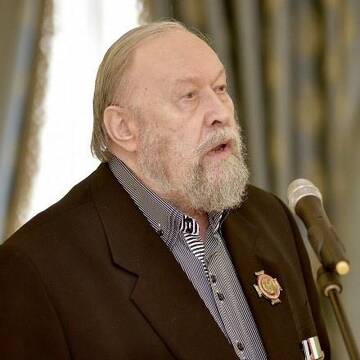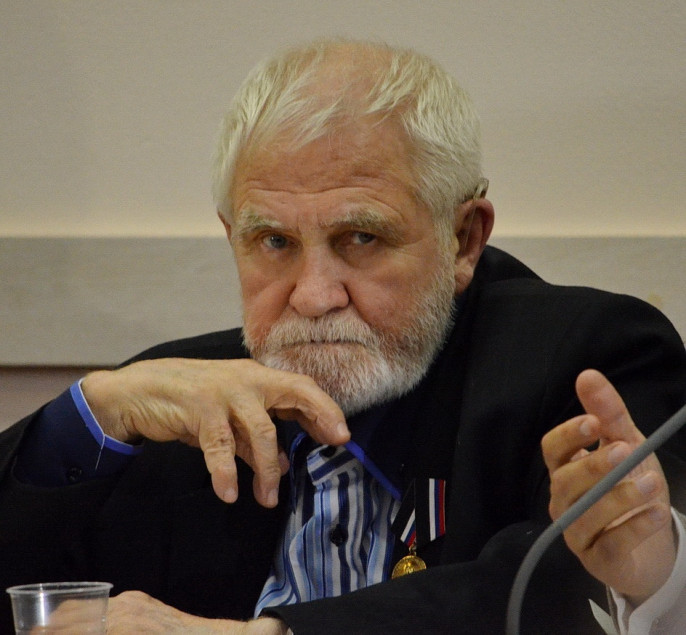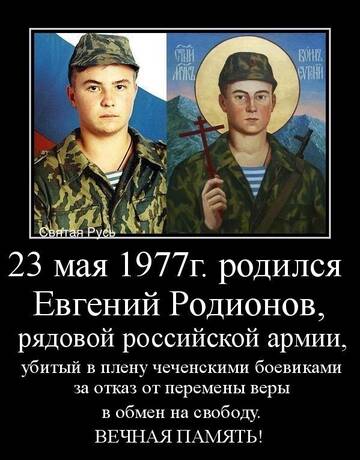He is even mentioned by the daughter of the famous Second World War hero Marshal
Georgii Zhukov in an interview, as well as in this statement made by the nationalist
historian, N. N. Lisovoi (2006):
Every Russian soldier, whether he fought in Europe or in Central Asia, knew
that he carried the Orthodox faith to the world. The main thing for him was
not to deny his faith. In our days in Chechnya, a Russian soldier, Evgenii
Rodionov, was tortured but did not deny his faith even under torture. In
the days of Skobelev, there was also a soldier who perished for his faith. He
was flayed alive. Perhaps this solider was illiterate, but he knew that he was a
citizen of Great Russia.1
1 All translations of the Russian and Church Slavonic texts: Per-Arne Bodin and Julie Hansen.
Каждый русский солдат, воевал ли он в Европе или в Средней Азии,
знал, что он несёт в мир православную веру. Главным для него было
– не отступиться от веры. В наши дни в Чечне был замучен русский
солдат Евгений Родионов, который под пытками не отказался от своей
веры. Во времена Скобелева тоже был солдат, погибший за веру. С него
живым содрали кожу. Этот солдат мог быть неграмотным, но знал, что
он – гражданин Великой России.
Evgenii himself is often compared, as in this example and in the following, compared
to Foma Danilov – a Russian soldier killed in Turkmenia in 1875 under similar
circumstances: ‘The feat of Evgenii Rodionov in our time is similar to the feat of
the soldier Foma’ («Подвиг Евгения Родионова в наше время подобен подвигу
воина Фомы», (Azarov 2006)). The story of Foma has become famous because it
was related by Dostoevsky in his Diary of a Writer (Dostoevskii 1983, 12–17).
Evgenii’s fate is seen as part of the Russian conquest of the Caucasus, and he is
thus considered to have given his life for the same cause as Foma Danilov (Azarov
2006):
But Evgenii demonstrated why there was a war. What was happening in
Chechnya was like a cancerous tumour. And it is no coincidence that so
much effort was dedicated in the 19th century to the suppression of the
Caucasus. The Caucasian war lasted for forty-six years precisely because it is
impossible to tolerate bandit enclaves on one’s frontiers.
А Евгений Родионов указал причину, из-за чего идет война. То, что
происходило в Чечне, это раковая опухоль. И не даром столько сил
было положено в XIX веке на завоевание Кавказа. Сорок шесть лет шла
кавказская война именно потому, что нельзя было у себя на границе
терпеть бандитский анклав.
The heroizing finally assumes enormous, hyperbolic proportions: Evgenii is not
only one of the heroes, he is the hero of the Chechen war. As stated in the article
‘Call me the Quiet Motherland’ (2000–2007): ‘An accomplished feat is not in vain.
[…] Perhaps no one has done more in this war than the soldier Evgenii Rodionov’.
(«Совершенный подвиг не бывает напрасным. […] Может быть, никто не
сделал на этой войне для России больше, чем солдат Евгений Родионов»).
Evgenii has been posthumously honoured with more than ten different medals
for his military feats, a very belated honour begrudgingly bestowed on him by the
military authorities. Even more significant is the following story told in connection
with him (Balabanov 2002):
Once a veteran from the Second World War visited Zhenia’s grave. He took
off his sign of distinction from the war front – his medal ‘For bravery’, and
placed it on the gravestone and said to Liubov’ Vasilevna: ‘I, my daughter,
know what war is. And I consider him to be worthy of this medal. He saved
the soul of Russia!’
Как-то на могилу к Жене приехал ветеран Великой Отечественной.
Снял с себя фронтовую награду – медаль «За отвагу», положил на
могильный камень и сказал Любови Васильевне: «Я, дочка, знаю, что
такое война. И считаю, что он достоин этой медали.
Он душу России спас!»
His feat is thus directly related to the Second World War, which is still of central
importance in the Russian collective memory. His heroism is hereditary. Evgenii is
thus connected both to the military endeavours of the tsars in the 19th century and
to the Second World War, both of which are cultural signs of enormous importance
in the Russian cultural and political context. In one text, all three discourses can be
traced (Shkurko 2005):
Evgenii did not betray his mother, his Homeland or his faith. The posthumous
order of bravery, a memorial plaque calling him a heroic frontier soldier at
the entrance of the school where he studied, his classmates’ remembrance of
him, and the grave of her son in native soil – this is all that remains for his
mother. What then gives her the strength to continue living, with her terrible
truth about the Chechnyan war? […] ‘Of course it is hard for me that my
son has died. But the fact that he remained a worthy son of his Homeland,
that he did not deny Christ or the Orthodox faith, consoles me. I do not
know if I would have survived if he had acted otherwise’.
Евгений Родионов не предал ни мать, ни Родину, ни Веру. Орден
мужества посмертно, мемориальная доска героя-пограничника при
входе в школу, где он учился, память одноклассников и могила сына
в родной земле. Это все, что осталось у матери. Что же дает ей силы
продолжать жить, оставаясь со своей страшной правдой о чеченской
войне? […] «Конечно, мне тяжело, что сынок погиб. Но то, что
он оказался достойным сыном Родины, не отказался от Христа, от
Православной Веры, меня утешает. Я не знаю, как бы я пережила, если
бы он поступил иначе».






